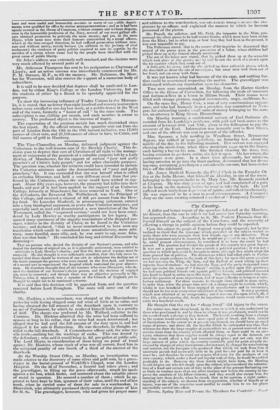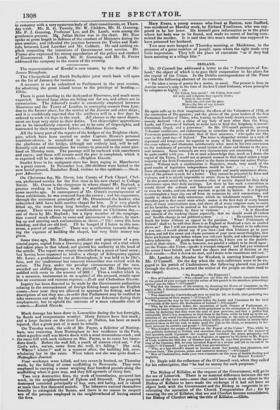Elie &until!.
A fuller and better report of the speeches delivered at the Manches- ter dinner, than the one to which we had access last Saturday morning, has appeared since. According to it, Mr. Poulett Thomson thus de- livered himself on the subject of the Corn-laws, and the necessity of effecting a change in public opinion before they could be repealed.
Upon this subject the people of England were greatly disagreed; but he was inclined to think that the ignorance which prevailed on the subject tended to make those who were amongst their best fneuds app so any alteration. How far that ignorance might be removed, he would not preend to say ; but certain- ly, under present circumstances, he considered it to have the result he had named. The question had divided the people of this country to a great degree. It was not a party question; it was scarcely a political question ; it was not a question in which men could be brought to unite, although they might adopt time same general line of polities. The discussions which had taken place in Parlia- Anent bore ample evidence to the truth of this fact ; for upon this great question we had not seen the Whig, the Tory, and the Radical as usual taking up their separate hues of conduct : we had seen the Tory, and the party designated sonic years arm under the name of " Liberal," uniting in policy upon thus question
ir ;
we had seen political friends vote against politieal friends, and political enemies join hand-in-liand in union upon this topic. But these circumstances only ren- dered the question of more importance, and of more fliffiellity to bring to a satis- factory settlement. For these reasons, he thought there should be more unity, in order that, when the proper time arrived, a change might be carried, which, whilst it was beneficial to those engaged in manufactures and in commerce, should not be less so to every other inhabitant of the country. It was a question which now admitted of no compromise; and it was one also upon which all, if they felt, as that meeting did, deeply its importance, would strain every effort to carry to a beneficial restilt.
He thought that the cry for "cheap bread" did injury to the cause.
his notion was, that cheap bread, in the "sense in which it was understood by those who proclaimed it, and by those to whom it was proclaimed, would not be the result of such a change as they desired. The benefit resulting from a change in the system would certainly be a more equal price of bread, and that, instead of fluctuations to the extent we at present experienced, we should have an equal range of prices; and above all, the benefits which he anticipated was this, that whereas we drew the large supplies of grain which we at present received at un- certain times from the country which affiurded them, so there could be no cer- tainty whatever that those supplies would be always equal to the demand, on that they would afford a fair aud remunerating price ; and not only was the large amount of price which the country eventually paid for grain actually in- creased by charges of other descriptions—for instance, by charges for warehousing and interest, but the foreigner who produced that which we took from him at uncertain periods had necessarily little to be paid for—for paid for at least it must be; and therefore lie could not acquire that taste for the products of our own country, which, under a fixed and regular scale of duty, he woulil be enabled profitably to do. However dry these details might have been the Meeting would forgive one who felt deeply upon the subject, who considered the substitu- tion of a fixed and certain rate of duty in the place of the present fluctuating one as likely to conduce more than any other measure now before the country to nn- prove the comforts of his fellow-citizens; and they would also excuse him for entering into these details, when he stated, that in hisopinion, a right under- standing of the subject, an absence from exaggeration, whether of benefit or of injury, was one of the requisites most needful to enable him to see his plans successfully carried into eftect.
Messrs. Spring Rice and Pryme, the Members for Cambrid—, (lituw7 in company with a very numerous body of their constituents, on Thurs- day reek. Mr. R. G. Townly, Mr. W. Childers, Mr. H. Gunning, Mr. F. J. Gunning, Professor Lee, and Dr. Lamb, were among the gentlemen present. M. Julian Sk rine was in the chair. Mr. Rice spoke at great length in defence of the conduct of Ministers during the past session; and ridiculed the junction between the Tories and Radi- cals, between Lord Lowther and Mr. Cobbett. He said nothing ex- plicit respecting the intentions of Government next session. Mr. Pryme also expressed his strong approbation of the policy and conduct of Government. Dr. Lamb, Mr. H. Gunning, and Mr. R. Foster addressed the company in the course of the evening.

















 Previous page
Previous page